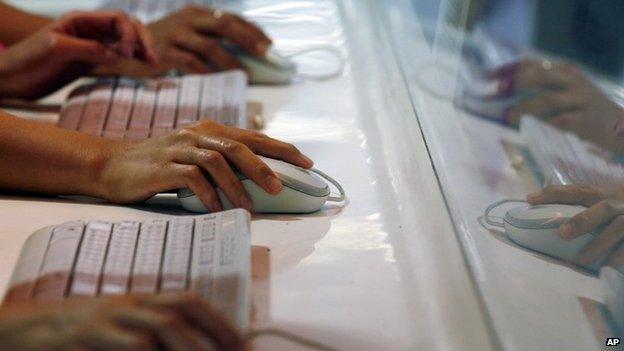Social media data 'could be used against you'
- Published

Pictures posted on social media could be "used against you" decades later, a senior executive at a technology giant has warned.
Social media brought great benefits but the public had yet to understand the full implications of living under "permanent scrutiny", he told BBC News.
"It's about being able to live a private life and whether that's possible".
He was speaking anonymously at a meeting at the Conservative conference.
The man, who works for one of the world's largest tech companies, cited the example of health insurance as an area where the unintended consequences of posting on social media might harm people financially.
'Internet of things'
"You have an insurance policy you have signed which says you are a non-smoker and you may have signed that back in 2002 or something.
"At the point at which you fall ill in your seventies if there is a single photograph of you on Facebook or any other social media that happens to show you holding a cigarette is your insurance policy completely voided?"
Then there was also a risk that the "internet of things" - household appliances and other devices talking to each other over the net - would collect data on your "habits of behaviour" that could be used against you.
Questioned afterwards about what his message to the public would be, he said there needed to be a debate about the way government, society and business collected and used data and what that meant for individual privacy.
"Your data may be used against you. I think that's exactly right. The risk though is that people become afraid of it and the upsides are so vast from technology so we have to help people to trust it."
'Take responsibility'
A former high ranking cyber-security expert with the British government told the meeting that the cost of online crime was being dramatically under-estimated.
"According to the Cabinet Office £56bn is lost in fraud and error every year. If you ask them off the record, they say the more they look, the more they find," said the man, who also did not wish to be named.
He said eliminating cyber fraud "could reduce the deficit in two and half years without austerity" or "just hand every household in the UK £2,500 in cash."
But there was no incentive for the government or the banks to take it seriously.
"How can government properly direct resource if it doesn't acknowledge the scale of the issue?
"If bank card fraud had been added to the official crime statistics then the level of reported crime would have gone up from 7.3 million cases to 11 million cases.
"And that means that police forces are not properly directing resource but it also means that citizens aren't engaged.
"Banks and insurers suck up the cost of fraud. It means higher premiums and charges for all of us."
He also urged individuals to "take responsibility for their actions" when they use online banking services.
At the moment, he argued, "if you lose your card, you worry about, but if you get your account hacked into, it's fine - the bank will pay".
"It's like dropping litter because you know that at some point the street sweeper will come along and pick it up."